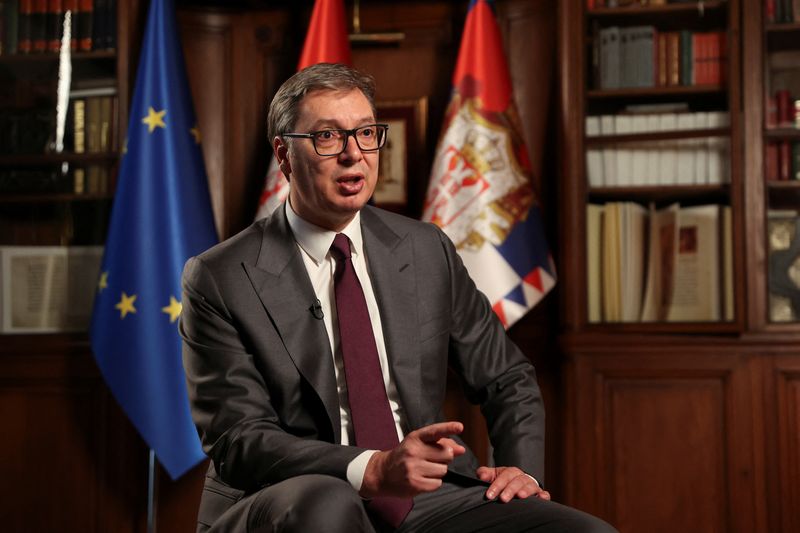By Ivana Sekularac and Aleksandar Vasovic
BELGRADE (Reuters) - Serbia will investigate the events that led to a gunbattle at a monastery in northern Kosovo that Pristina has blamed on Belgrade, President Aleksandar Vucic said on Thursday, denying any government involvement in the incident.
Kosovo police fought around 30 heavily armed Serbs who barricaded themselves into the Serbian Orthodox monastery in the village of Banjska for hours on Sunday. Three attackers and a Kosovo Albanian police officer were killed in the skirmishes.
Some 50,000 Serbs who live in north Kosovo, do not recognise Pristina institutions and see Belgrade as their capital. They have often clashed with Kosovo police and international peacekeepers, but the weekend's violence was the worst in years.
Vucic told Reuters that Belgrade condemned the killing of the policeman, adding Serbia "will launch proceedings before appropriate judicial bodies" and investigate suspects.
"What suspected crimes these would be, that is the question for the prosecutor," he said in his office in Belgrade.
He accused Kosovo police shooting dead one of the gunmen in the head "from the distance of a meter" after he had surrendered, describing it as an "execution".
Veton Elshani, deputy regional commander for the north of Kosovo, told Reuters: “This is nonsense. Our officers will never do such thing. One of the arrested men we gave first aid to in the field to save his life after he had sustained injuries.”
No group has come forward to claim responsibility for the attack or explain the motives of the gunmen.
Vucic denied allegations from Kosovo's President Vjosa Osmani that Belgrade had incited the violence, saying Serbia would not benefit from it as that would jeopardise its position in EU-sponsored talks with Pristina.
"Why this would be beneficial for Belgrade? What would be the idea? To destroy our position we have been building for a year? To destroy this in a day? ... Serbia does not want war," he said.
In 2012, Kosovo and Serbia committed to the EU-sponsored talks. Normalisation of relations is key for both counties to progress on the path towards integration with the EU.
SERB AUTONOMY
The gunbattle prompted renewed international concern about the stability of Kosovo, which declared independence in 2008, nearly a decade after NATO bombing ousted Serbian security forces from what was then Serbia's predominantly Albanian southern province.
Vucic pledged Serbia would investigate the origin of weapons seized after the incident by Kosovo police, who have displayed a cache including assault rifles, machine guns, anti-tank rocket launchers, hand grenades, land mines and drones.
He also said Milan Radoicic, one of the top-ranking Kosovo Serb politicians who, according to authorities in Pristina, was present during the gunbattle would be "summoned by the prosecutor".
Serbia considers Kosovo as its integral part and, with the backing of a number of countries, including United Nations Security Council veto-wielding members Russia, China and five EU members, refuses to recognise its independence.
Belgrade finances schools, public health system, and most of other institutions in parts of Kosovo where Serbs constitute a majority.
Vucic accused Kosovo Prime Minister Albin Kurti of wanting to expel Serbs from Kosovo and of stalling a compromise solution needed for mending the ties between Belgrade and Pristina.
"The cause of all problems in Kosovo is Albin Kurti. He is the one who brought about all of this," he said.
He said Kurti's refusal to form an Association of Serb Municipalities, a body that under provisions of a 2013 agreement between Belgrade and Pristina would secure Kosovo Serbs more autonomy, had fuelled tensions that led to the violence in Banjska.

Kurti has repeatedly said that such an association would enable Serb majority regions to secede and join Serbia.
"For us the position (in Kosovo) is clearly dreadful, but ... we have to be with our people, ... (and) try to preserve peace," Vucic said. "The solution is always (in) the dialogue."